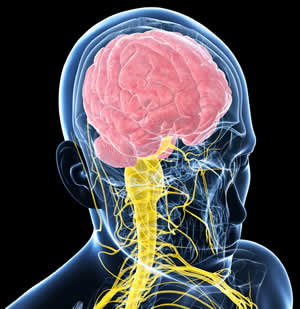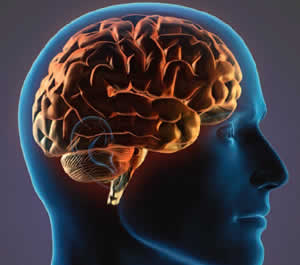Positive Health Online
Your Country

Nutrition for the Brain / Vitamins for the Brain?
listed in nutrition, originally published in issue 218 - November 2014
The crucial role that a good diet and nutrition play in long-term cognitive health is frequently overlooked. Our brain requires the right nutrition throughout all stages of life, the same as the rest of our body. Many factors such as age, illness, medication, stress, the menopause and pregnancy (etc.) can all affect our cognitive functions such as memory. A healthy diet with the appropriate nutrients such as essential fatty acids, vitamins and minerals is therefore essential.

Photo supplied by iStockphoto
The importance of good nutrition for cognitive health and development starts at preconception, and from there to pregnancy, breastfeeding and childhood development onward. In our teenage years onwards, mental acuity is needed for study and ultimately work. As the average human lifespan increases unfortunately incidences of certain ailments have increased too. This includes cognitive impairment such as Alzheimer’s and Dementia.
Sometimes it is difficult to achieve the necessary nutritive levels from diet alone and the appropriate nutritional supplements may help. Suitable levels of EPA/DHA found in Omega 3 fish and krill oils, for example, contribute to ‘the maintenance of normal brain function’. Whilst Vitamin B6 ‘Contributes to the normal function of the nervous system’ and both Vitamins B6 and Folate (Folic Acid) ‘Contribute to normal psychological functions’.
Stress and Digestion
It goes without saying that overall good health is conducive to good cognitive health too. If you are undertaking a good dietary and exercise regime for general well-being then this impacts positively on mental health too. A good example is looking after your digestion. Good gut health helps to ensure that the nutrients in the foods you eat are taken up efficiently by the body for appropriate use. And 90% of the neurotransmitter serotonin, which has the most profound effect on mood, is produced in our gut.
Similarly, suffering from stress can detrimentally affect our digestion, reducing its effectiveness in processing vitamins and minerals. Stress also negatively affects our body’s supply of B-Complex vitamins, essential for the nerves and cognitive functions.
Relevant Nutrients
Omega 3
How many people were told as a child to eat their fish because it is a ‘brain food’? The beneficial aspects of fish are mainly attributed to their Omega 3 content which comprises the ‘essential fatty acids’ ‘EPA’ and ‘DHA’. Omega 3 ‘fatty acids’ are necessary for human health but the body can’t make them - you have to get them through food, or supplements. So your bodily levels need regularly replenishing.
The EPA and DHA content of Omega 3 means that in appropriate quantities it has the permitted European health claim of “Contributing to the maintenance of normal brain function” (amongst various permitted claims including contributing to heart health and vision development). This is why good levels of Omega 3 are so important at all stages of life and especially for supporting development in children. For many people eating fish is not a popular option hence the increase in the use of relevant supplements such as fish oils and krill oils.
For vegetarians and vegans who do not eat fish there are suitable Omega 3 food and supplement alternatives such as flaxseeds and flaxseed oils.
B-Complex Vitamins
The eight B vitamins function in many different ways to help enzymes carry out thousands of molecular conversions in the body, and are therefore known as ‘co-enzymes’. All B vitamins are water soluble substances. The water solubility of the B-Complex vitamins means that any excess is excreted and not stored; therefore they must be continually replaced.
B-Complex Vitamins are necessary for the normal functioning of the nervous system and may be the single most important factor in the maintenance of the nerves. As B Vitamins are essential to our nervous system, stress places a greater burden on our B-Vitamin supply, quite literally ‘burning’ up our reserves.
Indeed one of the key factors exacerbating B-Vitamin depletion in our body is stress. The nervous system needs a good supply of B vitamins and magnesium for its functions. During times of stress the nervous system is more active and hence needs more nutrient support. The same scenario of ‘burden’ and ‘depletion’ of B-Complex Vitamins occurs with excess alcohol consumption.
Each of the B-Vitamins is generally to be found in plentiful supply in a good diet; for example Vitamin B6 can be found in meat, whole grains, cabbages, legumes, green vegetables etc. However vegans and vegetarians are often at risk of vitamin B12 deficiency as the vitamin is mainly found in animal based foods such as meats and offal.
As examples directly related to cognitive health, the following B-Complex vitamins have permitted European health claims that include:
- Vitamin B12 contributes to normal functioning of the nervous system and normal psychological function;
- Pantothenic acid (B5) contributes to normal mental performance;
- Vitamin B6 and Niacin (vitamin B3) contribute to the normal functioning of the nervous system;
- Vitamins B12, B6, B1 and Folic Acid contribute to normal psychological function;
- If you research this health matter you will find the B-Vitamins frequently cited in research relating to cognitive health.
Iron
The mineral iron is found acting in the brain as a co-factor in the synthesis of serotonin, dopamine and noradrenalin, which are known to regulate behaviour. Iron has the permitted European health claims of ‘contributing to normal cognitive function’ and ‘Iron contributes to normal cognitive development of children’.
It is important to note that there are two distinct population groups relating to iron; adult men and post-menopausal women have no great requirements for iron and should get all their needs from their diet. However children and menopausal women have much greater needs for iron and may need an iron supplement to support suitable levels. Iron is included in most baby formulas and is especially relevant during pregnancy and breast-feeding.
It is a common perception that for vegetarians and vegans iron deficiencies and anaemia are common and due to the absence of meat in the diet. There are however plentiful sources of iron in popular vegetarian and vegan food sources such as pulses and tofu. However vegetarians and vegans should be mindful that ‘Haem’ Iron comes primarily from meat.
Minerals
The following minerals have permitted European health claims specifically related to cognitive health:
- Zinc contributes to normal cognitive function;
- Magnesium contribute to normal psychological function;
- Iodine contributes to normal cognitive function and the normal functioning of the nervous system.
Anyone looking to take a food supplement whether comprising a single vitamin, mineral or other nutrient, or a multi-formulation (such as a multivitamin) - if in any doubt should seek the advice of a health professional or advice directly from the supplement company, particularly if you have any pre-existing health conditions. And when looking at multi-formulations choose one specifically tailored to your age and gender (and again mindful of pre-existing health conditions if applicable).

Photo supplied by iStockphoto
Contributing Factors - Both Good and Bad
All of the following are health issues which are either considered contributing factors in supporting good health and particularly cognitive health; and also oppositely factors that should be strongly avoided or minimized as they are bad for health and cognitive health.
Keep mentally stimulated: Maintain ‘brain training’ throughout your life and in particular when you retire. Stimulating your brain with challenges from the simple such as crosswords and Sudoku to the more complex such as learning a new language will all help to keep your brain ‘exercised’ - and this is really important;
Keep physically stimulated: Maintaining a regular fitness activity is important for overall health and cognitive health equally too. This doesn’t have to be a sweaty gym workout; yoga, Pilates, Tai-Chi and similar disciplines are all considered worthwhile routines to undertake. However it’s hard to beat a simple half-an-hour walk most days of the week for physical and mental stimulation;
Environmental factors: Avoid airborne pollutants as much as possible. Particularly for children. Pollution from traffic is especially relevant (and to be avoided where possible) in the UK;
Additives in foods and drinks: Are to be avoided as much as possible. Particularly for children. A class of chemicals called ‘excitotoxins’ are extremely common in our food chain and may be simply described as ‘taste enhancers’. However excitotoxins overstimulate neuron receptors leading to their exhaustion and death. There is concern for the cognitive affect these chemicals have particularly in relation to health issues such as behaviour and emotions, sleep cycles and immune functions. This is especially relevant in child development.
The simple rule is the more a food is ‘refined’, ‘processed’ or a ‘fast food’ - the more likely it is to have higher levels of additives. Such foods are also likely to be low in nutritive values and in a processed form not best suited to the human digestive system. Similarly, many soft drinks, particularly carbonated ones have not only worrying levels of additives but also high levels of refined sugars.
A healthy diet: Is to be completely encouraged for general health and cognitive health too. You can research organizations and charities that support good cognitive health and the consistent dietary recommendations you will find comprise:
- Encourage a diet high in fruit and vegetables - lots of fruit and vegetables across ‘the colour spectrum’ daily for antioxidants, vitamins, minerals and good fibre;
- Avoid saturated fat and fast-acting carbohydrates - avoid excess saturated fats such as animal fats, avoid all trans fats, avoid processed carbohydrate foods;
- Eat meats and poultry in moderation - avoid processed meats and ideally eat organic meat and poultry (where applicable);
- Eat plenty of fish - fish is rich in Omega 3 essential fatty acids and to be encouraged at all stages of life; particularly oily fish (recommendations vary in pregnancy);
- Avoid processed or refined foods and drinks;
- Avoid sugar and sugar rich foods (processed carbohydrates);
- Encourage a diet high in the B-Complex vitamins;
- Encourage complex carbohydrates in your diet - ‘slow acting’ carbohydrates in moderation for fibre and energy are encouraged;
- If you are a vegetarian or vegan - ensure you are not deficient in important nutrients for mental and physical health that are typically found in meats and fish. These most commonly are Omega 3 (fish), Haem Iron (meat) and Vitamin B12 (meat). There are many suitable vegan alternative food sources and supplements available;
- It should be noted that some health professionals would argue that a long-term diet that is very low in fat may be detrimental to brain health as the brain is made up of over 60% fat or more.
Lifestyle factors: Smoking and alcohol are to be discouraged in supporting cognitive health. Stress is hard to avoid; however this does place a burden on the body’s nutritional supplies, particularly the B-Complex vitamins. Supportive relationships with family, partners and work-mates are to be encouraged for emotional nutrition and a sensible work-life balance.
Comments:
-
No Article Comments available